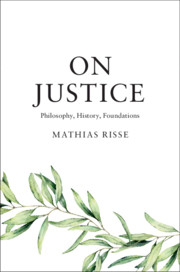Book contents
- On Justice
- On Justice
- Copyright page
- Contents
- Acknowledgments
- Introduction
- 1 Apologia for Justice
- Part I Political Philosophy
- Part II Distributive Justice
- 7 Distributive Justice and the Great Tale of Humanity
- 8 Origins
- 9 Antiquity and Beyond
- 10 Approaching the Present
- 11 Global Justice
- 12 Pluralist Internationalism
- Part III The Grounds of Justice
- Bibliography
- Index
10 - Approaching the Present
from Part II - Distributive Justice
Published online by Cambridge University Press: 18 September 2020
- On Justice
- On Justice
- Copyright page
- Contents
- Acknowledgments
- Introduction
- 1 Apologia for Justice
- Part I Political Philosophy
- Part II Distributive Justice
- 7 Distributive Justice and the Great Tale of Humanity
- 8 Origins
- 9 Antiquity and Beyond
- 10 Approaching the Present
- 11 Global Justice
- 12 Pluralist Internationalism
- Part III The Grounds of Justice
- Bibliography
- Index
Summary
Kant developed an understanding of justice to enable free and equal citizens to coexist in ways that respected the moral status of each. Individuals owe each other the founding of states to coexist under public law that protects safety and integrity. An account of distributive justice is part of what we need to explain what sort of entity the state ought to be. But even though the modern concept had become available in the late eighteenth century, important intellectual movements organized around alternative responses to the social question arose roughly at that time. Rawls’s theory is a response to them that offers a substantial elaboration of the notion of social justice. Rawls does not merely defend one idea as central to distributive justice but integrates various approaches. Recognizing the breadth of the domain to which considerations of distributive justice apply makes it doubtful that a unitary criterion could guide distribution.
- Type
- Chapter
- Information
- On JusticePhilosophy, History, Foundations, pp. 193 - 220Publisher: Cambridge University PressPrint publication year: 2020



